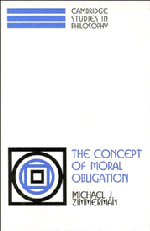Book contents
- Frontmatter
- Contents
- Preface
- Acknowledgments
- 1 Groundwork: Some distinctions
- 2 Moral obligation: An analysis
- 3 The dynamics of obligation
- 4 Conditional obligation
- 5 Prima facie obligation
- 6 Actualism and possibilism
- 7 Dilemmas
- 8 Supererogation
- 9 Cooperation
- Postscript
- Appendix: List of propositions
- List of works cited
- Index of names
- Index of subjects
8 - Supererogation
Published online by Cambridge University Press: 18 February 2010
- Frontmatter
- Contents
- Preface
- Acknowledgments
- 1 Groundwork: Some distinctions
- 2 Moral obligation: An analysis
- 3 The dynamics of obligation
- 4 Conditional obligation
- 5 Prima facie obligation
- 6 Actualism and possibilism
- 7 Dilemmas
- 8 Supererogation
- 9 Cooperation
- Postscript
- Appendix: List of propositions
- List of works cited
- Index of names
- Index of subjects
Summary
Steve, introduced in Chapter 5, stopped to render first aid to Carl, who had had a car accident, thereby failing to keep his dinner date with Dave. This case was used, following W. D. Ross, as an illustration of one prima facie obligation overriding another and thereby constituting an overall obligation. But was Steve really overall obligated to do what he did? I am sure that many would say that he was not. On the contrary, they would say that he went well beyond the call of duty; his action was supererogatory.
THE NATURE OF SUPEREROGATION
Going beyond prima facie obligation
It may be that some writers consider supererogation simply to consist in going beyond some prima facie duty or obligation. This is one way to interpret, for instance, the following passage by Joel Feinberg:
A janitor has a duty to spend eight hours cleaning his employer's floors. He works ten hours for eight hours' pay. Duty required eight hours; he gave duty plus two, and thus in a perfectly intelligible sense, did “more than” his duty.
This passage may seem to suggest that the janitor has a prima facie obligation (of fidelity, perhaps) to work eight hours; in working ten hours, he goes beyond this duty and thus performs a supererogatory action. But even if that is what this passage suggests, it is not, I am sure, what most people have meant by the term “supererogatory,” and it is not what I shall mean by it.
- Type
- Chapter
- Information
- The Concept of Moral Obligation , pp. 232 - 253Publisher: Cambridge University PressPrint publication year: 1996



